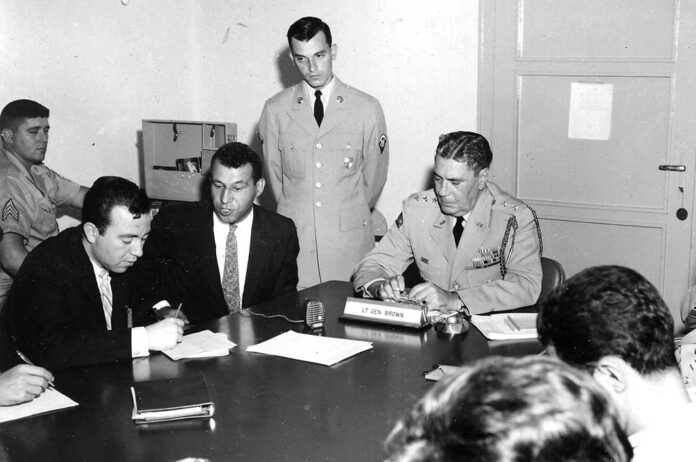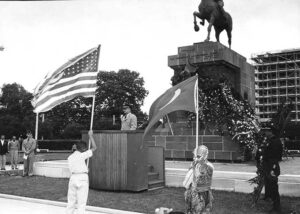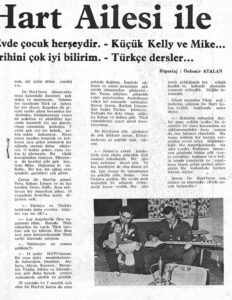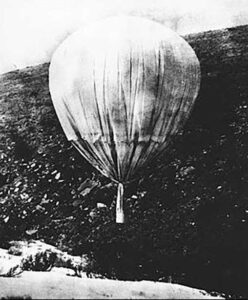
Part two of a series
After joining the Army when he turned 17, David Dehart finished boot camp and paratrooper school before being “pipelined” to Korea where he had standard GI jobs. He spent a year as a deuce and a half GM truck driver transporting prisoners. And when promoted to Corporal, six months as a supply sergeant. He next returned to the states where his military duties were not so ordinary. He first was a chauffeur for 18 months for a General in the LA area who helped him get admitted to a one year language immersion program in Monterey. He says he had a choice between Russian and Turkey. Even though he did not know there was a country named Turkey, he decided it would be better duty. Also, his wife was able to join him from Portland and set up housekeeping in Monterey.

In November 1960, David was assigned to Izmir, Turkey as the interpreter/translator for the Commanding General of Allied Forces Southeastern Europe (a NATO command), Lt. General Harry P. Stork. His duties included assisting with press conferences and public events. He fondly recalls an event In 1961. He was tasked with interpreting for General Charles Brown at a “homecoming” celebration for the return of the Turkish Light Infantry Brigade. The Turks had just returned from their tour of duty on the Korean DMZ. The event was held in the Ataturk Memorial Plaza on the Izmir waterfront The general spoke first in English, then David read the speech in Turkish. It went over very well, because the next day’s newspapers featured a photo of David addressing the troops

General Stork also had David accompany him to parties and conferences as his interpreter translator “to get the straight skinny”. There were Turkish translators at these events but David said they “did not want to embarrass themselves or their people or their country”. When the General would ask questions, what the Turkish interpreter told him in English was sometimes different than what David heard. So the General liked to have an American interpreter with him. There were no US military bases in Turkey then so David and his wife lived in the community, an apartment in Izmir. David said that was an exceptional cultural experience, finding the Turks to be wonderful people. Also during their three year stay in Turkey, David and his wife flew to Beirut, Lebanon to adopt their two children, an 18 month old boy and a four month old girl.

David entered a third phase in his career in the summer of 1962 when sent to the US Army Intelligence School at Fort Holabird, Maryland. After completing the six month course, he was designated a Special Agent, Counterintelligence. David said the most interesting phase of the training for him was the counter-surveillance techniques used to follow a suspect, and how to prevent being followed. This training was conducted in the huge public market in downtown Baltimore. He explained that it “was not only a challenging exercise for the person being surveilled, but essential when and if I was in a similar situation.” His first assignment was back in Oregon, as a Special Agent in Eugene. The three-man office there was in the basement of the Post Office building. He said “our primary mission was background investigations for government positions requiring a security clearance. We also conducted investigations of military personnel and government civilian contractors suspected of activity detrimental to the best interests of the American government.” Also “occasionally we assisted local law enforcement in matters of national security.” With an operational area covering Oregon outside of the tri-county area., this required considerable time away from his family. One unusual event was investigating a report of a strange paper balloon, hanging from a tree in the Willamette National Forest, east of Eugene. He said “Upon close inspection, determined it was a Japanese anti-personnel bomb that had been launched by the Japanese navy off the Oregon coast during WWII. We called in the Ordinance Disposal Team from Vancouver Barracks to retrieve and defuse it.”
At this point in his career, David is trained in Turkish and military intelligence. He expected to return to Turkey. But, after six months in Oregon, he was sent to Korea. This was in much different circumstances than his first duty there. He is in civilian clothing status. He flew commercial air. His assignment there is to capture North Korean espionage agents infiltrating into the South.


















